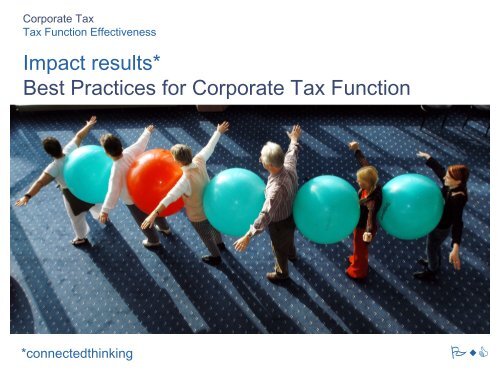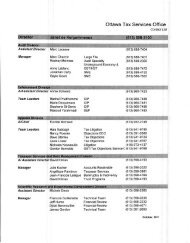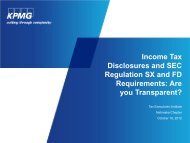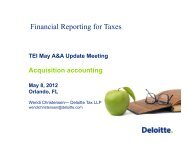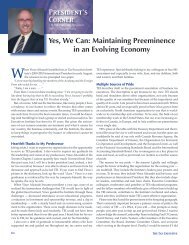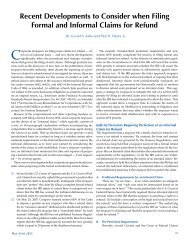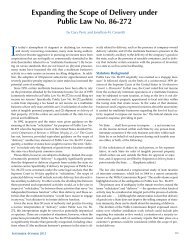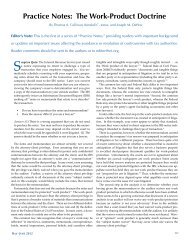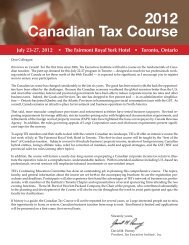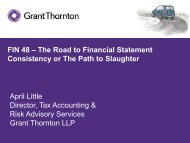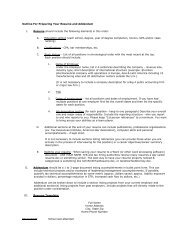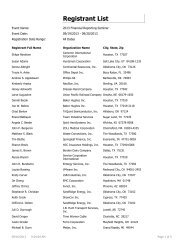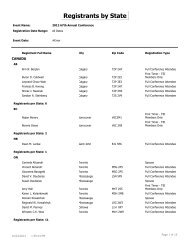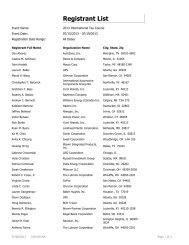2008 0326 PPT_-_Best_Practices.pdf - Tax Executives Institute, Inc.
2008 0326 PPT_-_Best_Practices.pdf - Tax Executives Institute, Inc.
2008 0326 PPT_-_Best_Practices.pdf - Tax Executives Institute, Inc.
You also want an ePaper? Increase the reach of your titles
YUMPU automatically turns print PDFs into web optimized ePapers that Google loves.
Corporate <strong>Tax</strong><br />
<strong>Tax</strong> Function Effectiveness<br />
Impact results*<br />
<strong>Best</strong> <strong>Practices</strong> for Corporate <strong>Tax</strong> Function<br />
*connectedthinking<br />
*connectedthinking<br />
•<br />
•
The views expressed in this presentation are not intended as,<br />
and should not be relied on, as accounting, auditing, regulatory,<br />
or tax advice. This document was not intended or written to be<br />
used, and it cannot be used, for the purpose of avoiding U.S.<br />
federal, state or local tax penalties.<br />
The outcome of any independent situation depends on the<br />
specific facts and circumstances in which the issue arises and on<br />
the interpretation of FAS 109 and other relevant literature, laws,<br />
and regulations in effect at the time.<br />
<strong>Tax</strong> Function Effectiveness<br />
PricewaterhouseCoopers<br />
2
Agenda<br />
• Issues driving change in the <strong>Tax</strong> function<br />
• A new way of looking at <strong>Tax</strong> operations – Critical Enablers<br />
1<br />
2<br />
3<br />
4<br />
5<br />
6<br />
7<br />
People<br />
Process<br />
Technology<br />
Data<br />
Controls<br />
Strategy<br />
Structure<br />
<strong>Tax</strong> Function Effectiveness<br />
PricewaterhouseCoopers<br />
3
Introduction<br />
• Corporate tax functions are experiencing<br />
significant operational challenges due<br />
to regulatory changes and emerging<br />
market trends<br />
• These challenges have resulted in<br />
internal control deficiencies, financial<br />
restatements, resource shortages or in<br />
some extreme instances, a general loss<br />
of confidence in tax function<br />
• CFO's and <strong>Tax</strong> VP's are expressing<br />
interest in new ways to avoid many of<br />
missteps experienced by other<br />
companies<br />
• Convergence of these events has led<br />
many companies to focus on ways to<br />
improve operational effectiveness of<br />
their corporate tax function<br />
<strong>Tax</strong> Function Effectiveness<br />
PricewaterhouseCoopers<br />
4
Introduction - Today’s Challenges<br />
VP <strong>Tax</strong><br />
Regulatory Issues<br />
• Sox 404<br />
• FIN 48<br />
• IRS access to provision workpapers<br />
• IRS focus on contemporaneous<br />
documentation<br />
• e-filing<br />
• FAS 123R<br />
• Reportable transactions<br />
• Transfer pricing<br />
• Focus on transparency<br />
• US Senate Permanent Subcommittee on<br />
Investigations<br />
<strong>Tax</strong> Function Trends<br />
• Internal control deficiencies<br />
• <strong>Inc</strong>rease in restatements due to<br />
tax accounting<br />
• Data quality or access issues<br />
• Difficult/lengthy closing process<br />
• Historic under-investment in technology and<br />
process improvement compared to overall<br />
Finance function<br />
• Inefficient processes, use of technology<br />
• Lack of collaboration with stakeholders<br />
• Leadership changes<br />
• Outdated compensation models<br />
• Resource shortages<br />
• <strong>Inc</strong>reased questions about off-shoring<br />
• IFRS convergence<br />
<strong>Tax</strong> Function Effectiveness<br />
PricewaterhouseCoopers<br />
5
Common <strong>Tax</strong> Operational Impediments<br />
• High overtime<br />
• Low morale<br />
• Market resource shortages<br />
• Headcount limitations<br />
• Excessive use of temporary workers<br />
• Outdated compensation models<br />
• Less staff coaching and staff development<br />
• Lack of senior management appreciation<br />
for emerging challenges<br />
• Lack of succession planning<br />
• Isolation of tax staff<br />
• Inefficient processes<br />
• Excessive use of spreadsheets<br />
• Inability to influence others outside of tax<br />
• Historical “hybrid APB 11” approach<br />
• FIN 18 challenges<br />
• Multiple manual touches of data<br />
• General loss of confidence in tax<br />
• Extensive reserve account reconciliation process<br />
• Lack of integrated technology platform<br />
• Little support from IT<br />
• Poor data quality/lack of data mapping<br />
• Difficult data accumulation from international<br />
operations<br />
• Difficult relationships with external auditors<br />
• Less time for analytical review<br />
• One way communication with finance/cultural<br />
challenges<br />
• “Bottoms up” approach to controls<br />
• Crisis mentality with less time for planning<br />
• Disincentives for claiming prior refunds<br />
• Difficulty generating information to support<br />
planning<br />
• Lack of individual or departmental goals<br />
• Poor internal collaboration due to<br />
ineffective structure<br />
• Lack of alignment to businesses<br />
• Top heavy staffing / lack of leverage<br />
• Difficulty responding to legislation<br />
<strong>Tax</strong> Function Effectiveness<br />
PricewaterhouseCoopers<br />
6
A Critical Disconnect Between Finance and <strong>Tax</strong><br />
Observation:<br />
A staggering 48 point variance in<br />
the priorities expressed by those<br />
in <strong>Tax</strong> as compared to Finance<br />
peers related to tax accounting.<br />
A frustrating 25 point variance in<br />
the priority for <strong>Tax</strong> technology<br />
projects.<br />
Conclusion:<br />
This disconnect presents a major<br />
challenge for <strong>Tax</strong> executives. A<br />
greater effort seems necessary<br />
to educate Finance as to the<br />
value proposition for <strong>Tax</strong><br />
technology initiatives.<br />
<strong>Tax</strong> Function Effectiveness<br />
PricewaterhouseCoopers<br />
Source: Building a More Effective <strong>Tax</strong> Function, CFO Research<br />
Services and Hudson Financial Solutions, October 2006<br />
7
The <strong>Tax</strong> <strong>Best</strong> <strong>Practices</strong> Continuum<br />
Typical<br />
Improving<br />
<strong>Best</strong> in Class<br />
• Significant deficiencies - SOX<br />
• High turnover<br />
• Headcount higher than peers<br />
• Low technology investment<br />
• Little IT support<br />
• Poor linkage with finance<br />
• Lack of CFO level support<br />
• File on statutory due dates<br />
• Material provision to return<br />
adjustments<br />
• Little interaction with BU’s<br />
• Progress toward addressing<br />
SOX deficiencies<br />
• Stable tax team<br />
• Headcount in line with peers<br />
• Periodic formal interaction with<br />
business units<br />
• Sporadic IT allocations for<br />
initiatives and maintenance<br />
• File on or shortly before<br />
statutory due dates<br />
• Controls integrated into<br />
processes<br />
• Strong CFO support for <strong>Tax</strong><br />
• Board and management<br />
interaction<br />
• Strong interaction with business<br />
units<br />
• Great place to work initiatives<br />
• Leverage model for staffing<br />
• Appropriate IT support<br />
• <strong>Tax</strong> IT budget<br />
• Immaterial provision to return<br />
• Strong linkage with accounting<br />
• <strong>Tax</strong> risk management focus<br />
• File in advance of stat due dates<br />
• Continuous improvement<br />
<strong>Tax</strong> Function Effectiveness<br />
PricewaterhouseCoopers<br />
Where are you<br />
8
PwC’s <strong>Tax</strong> Function Effectiveness Framework<br />
Differentiates “<strong>Best</strong> in Class” <strong>Tax</strong> Functions<br />
<strong>Tax</strong> Function Deliverables<br />
<strong>Tax</strong> Planning<br />
<strong>Tax</strong> Accounting<br />
People<br />
Process<br />
Technology<br />
Data<br />
Enablers<br />
<strong>Tax</strong> Compliance<br />
Risk Management<br />
Controls<br />
Leadership and Organization<br />
Career Development and Challenge<br />
Strategy<br />
<strong>Best</strong> in Class <strong>Tax</strong> Technology Platform<br />
Audit Defense<br />
Internal Communication with <strong>Tax</strong> Stakeholders<br />
Structure<br />
<strong>Tax</strong> Function Effectiveness<br />
PricewaterhouseCoopers<br />
<strong>Best</strong> in Class Differentiators<br />
9
Contents<br />
1<br />
People<br />
2<br />
3<br />
4<br />
5<br />
Process<br />
Technology<br />
Data<br />
Controls<br />
6 Strategy<br />
7<br />
Structure<br />
<strong>Tax</strong> Function Effectiveness<br />
PricewaterhouseCoopers<br />
10
<strong>Best</strong> <strong>Practices</strong> – People<br />
Fundamentals<br />
• Do we have the right # of people<br />
• Do they have the appropriate technical competencies<br />
• Are they in the right locations<br />
• Are the reporting lines effective<br />
• Is there a viable career path and succession plan<br />
Key Themes:<br />
• More reliance on Senior <strong>Tax</strong> Executive to represent the <strong>Tax</strong><br />
Function to internal stakeholders (Business Units, Board,<br />
Controllers, IT)<br />
• Closer connection to business units<br />
• Integration with Finance - Internal collaboration to facilitate<br />
knowledge sharing<br />
• Strategic training to build new skills and foster a coaching<br />
development environment<br />
<strong>Tax</strong> Function Effectiveness<br />
PricewaterhouseCoopers<br />
11
Changing Skill Set - <strong>Best</strong> in Class <strong>Tax</strong> Leadership<br />
Issues Driving Change<br />
• Short supply of qualified personnel<br />
FAS109 talent<br />
is scarce<br />
Staff retention and<br />
developing in-house talent is<br />
increasingly important<br />
• Higher risk associated with tax<br />
function leads to more attention<br />
from and interaction with senior<br />
executives<br />
• Convergence of need for speed to<br />
meet faster close cycle times and<br />
increasing demand for<br />
transparency in financial reporting<br />
with rapid fire changes in tax and<br />
accounting rules impacting taxes<br />
(141(R), FIN 48, 123R, FAS5, Sec<br />
199)<br />
These skills will become<br />
increasingly important and<br />
differentiate best in class tax<br />
leadership from typical<br />
• People development<br />
• Coaching<br />
• Mentoring<br />
• Executive presence<br />
• Presentation skills<br />
• Insight<br />
• Forward thinking<br />
• Global relationships<br />
• Collaborative style<br />
<strong>Tax</strong> Function Effectiveness<br />
PricewaterhouseCoopers<br />
12
Emerging Role - <strong>Tax</strong> Controller<br />
A <strong>Best</strong> Practice picking up momentum is establishment of a new position on<br />
the <strong>Tax</strong> Organization Chart - <strong>Tax</strong> Controller<br />
<strong>Tax</strong> Controller Role:<br />
Risk Management<br />
<strong>Tax</strong> Risk Management (TRM) policy development and execution<br />
404 Management<br />
404 compliance to include control definition, documentation and planning for their<br />
execution and testing<br />
FAS109 Technician<br />
<strong>Tax</strong> Accounting Technician - <strong>Tax</strong> Controller will have skills to properly assess tax<br />
accounting treatment and related disclosure for a broad range of corporate transactions<br />
<strong>Tax</strong> B/S Accounts<br />
Owns accuracy of <strong>Tax</strong> balance sheet accounts related to payables and deferred taxes<br />
<strong>Tax</strong> Reserves<br />
FIN48 and FAS5 – responsible for <strong>Tax</strong> accounting compliance with key GAAP<br />
pronouncements such as FAS 141(R), FIN48, FAS5, FAS123R, FIN18 and others<br />
Attest Firm Liaison<br />
Primary liaison with independent attest firm in connection with their audit examinations<br />
<strong>Tax</strong> Function Effectiveness<br />
PricewaterhouseCoopers<br />
13
Contents<br />
2<br />
1<br />
3<br />
4<br />
5<br />
People<br />
Process<br />
Technology<br />
Data<br />
Controls<br />
6 Strategy<br />
7<br />
Structure<br />
<strong>Tax</strong> Function Effectiveness<br />
PricewaterhouseCoopers<br />
14
<strong>Best</strong> <strong>Practices</strong> - Process<br />
Fundamentals<br />
• Are they fresh<br />
• Is there a better way<br />
• Are there unnecessary gatekeepers<br />
• Are there other dependencies causing loss of control<br />
• Is there standardization and consistency<br />
• Do they satisfy control requirements<br />
Key Themes:<br />
• Side by side collaboration with Controllers and bright line ownership<br />
of tax accounting is well defined<br />
• Integrate tax compliance, planning and controversy with tax<br />
accounting<br />
• <strong>Inc</strong>reased focus on FIN18 requirements rather than “hard close” on<br />
the quarters.<br />
• Standardize and document key policies and processes in the form of<br />
Operations Manual<br />
<strong>Tax</strong> Function Effectiveness<br />
PricewaterhouseCoopers<br />
15
The process paradigm shift<br />
The strategic vision for world class tax organizations regarding tax reporting and<br />
compliance is a lower overall work load and more time focused on value-added<br />
decision support. This includes tax planning and analysis.<br />
Current Environment<br />
“Paradigm<br />
Shift”<br />
Strategic Vision<br />
<strong>Tax</strong> planning & analysis<br />
Reporting, control & controversy<br />
Actions:<br />
• Simplify and standardize processes<br />
through clearly communicated<br />
policies and procedures, including<br />
materiality in key tax processes<br />
• Elimination of redundant processes,<br />
rework activities and manual data<br />
manipulation.<br />
• Improve process through technology<br />
and data enablers:<br />
<strong>Tax</strong> sensitize financial reporting<br />
systems<br />
Implement data management<br />
tools to reuse data across the tax<br />
function<br />
Results:<br />
• Enhanced value to the company<br />
• Optimized resource utilization<br />
• Integrated processes with finance<br />
• Reduced time to report<br />
<strong>Tax</strong> Function Effectiveness<br />
PricewaterhouseCoopers<br />
Data collection and manipulation<br />
16
Process improvement objectives<br />
• Enable tax and finance business<br />
partnership through process<br />
excellence<br />
• Deliver the “right” information at the<br />
“right” time<br />
• Create clear roles &<br />
responsibilities for each process<br />
• Ensure internal controls and<br />
accountability are consistent and<br />
clear<br />
• Improve accuracy of deliverables<br />
• Identify necessary investments for<br />
optimal delivery<br />
Strategic Vision<br />
<strong>Tax</strong> planning & analysis<br />
Reporting, control & controversy<br />
Data collection and manipulation<br />
<strong>Tax</strong> Function Effectiveness<br />
PricewaterhouseCoopers<br />
17
Contents<br />
3<br />
1<br />
2<br />
4<br />
5<br />
6<br />
7<br />
People<br />
Process<br />
Technology<br />
Data<br />
Controls<br />
Strategy<br />
Structure<br />
<strong>Tax</strong> Function Effectiveness<br />
PricewaterhouseCoopers<br />
18
On-Site and Off-Site Stakeholders<br />
ERP<br />
SAP<br />
Oracle<br />
PeopleSoft<br />
JDE<br />
1<br />
3<br />
Web-enabled<br />
data collection<br />
<strong>Tax</strong> Function Web Portal<br />
4<br />
7<br />
Web access to<br />
completed<br />
work product<br />
1<br />
Extract,<br />
Transform and<br />
Load Tools<br />
2<br />
Work in Process<br />
<strong>Tax</strong><br />
Data Repository /<br />
Business Warehouse<br />
(Legal Entity Books)<br />
<strong>Tax</strong> Provision<br />
Software<br />
Compliance<br />
Software<br />
Planning/Audit<br />
Defense Software<br />
5 6<br />
Final Product<br />
Document<br />
Management System<br />
Version & Access Control<br />
Audit-Ready Files<br />
Classify, index, sort<br />
& report<br />
<strong>Best</strong> in class tax technology platform<br />
<strong>Tax</strong> Function Effectiveness<br />
PricewaterhouseCoopers<br />
19
Tips for embarking on technology improvements….<br />
1. Take it in small pieces, it’s a modular solution<br />
2. Prioritize the components to meet your most urgent requirements<br />
3. Stage implementation over years to manage the budget and manage the<br />
change<br />
<strong>Tax</strong> Function Effectiveness<br />
PricewaterhouseCoopers<br />
20
Quantifying the Technology & Process Improvement Value<br />
Proposition<br />
Greater Efficiencies + Lower Risk of Error - Cost to Implement =<br />
ROI<br />
Create Capacity among Staff<br />
Improve Quality of Deliverables<br />
Lower Staff Turnover<br />
<strong>Inc</strong>rease Analysis<br />
Retain Institutional Knowledge<br />
Enhance Knowledge Sharing<br />
Connect <strong>Tax</strong> Personnel Globally<br />
Simplify Response to Audits<br />
Strengthen Internal Controls<br />
Improve Forecasting Capability<br />
<strong>Tax</strong> Function Effectiveness<br />
PricewaterhouseCoopers<br />
Value Proposition Components<br />
<strong>Tax</strong> Technology and Process Improvement Investment<br />
21
Benchmarking Data - <strong>Tax</strong> Technology Spend<br />
PwC Observations<br />
• Outdated technology due to<br />
historical low priority<br />
• Use of tax preparation software<br />
for income and sales/use tax and<br />
often little else<br />
• Most <strong>Tax</strong> functions struggle to<br />
justify a budget to build out a tax<br />
data warehouse, integrate<br />
systems, implement a document<br />
management system, etc.<br />
• Finance leaders don’t fully<br />
understand the need for<br />
investments in <strong>Tax</strong> technology<br />
and process improvement efforts.<br />
Source – TEI 2004-2005 Corporate <strong>Tax</strong> Department Survey<br />
<strong>Tax</strong> Function Effectiveness<br />
PricewaterhouseCoopers<br />
22
Future of 21st Century <strong>Tax</strong> Technology<br />
Market Trends<br />
• Eventual vendor consolidation<br />
• Potential competition from ERP<br />
and consolidation providers<br />
• <strong>Inc</strong>reased use of tax data<br />
warehouse applications<br />
• Integration of tax accounts,<br />
compliance, defense, planning,<br />
provision, work flow, and<br />
document management<br />
• <strong>Inc</strong>reased exploration and pursuit<br />
of off-shoring<br />
<strong>Tax</strong> Function Effectiveness<br />
PricewaterhouseCoopers<br />
23
Scanning the market for <strong>Tax</strong> Technology: What’s available<br />
Current Inventory of Applications<br />
• <strong>Tax</strong> data warehouse<br />
• <strong>Tax</strong> preparation<br />
• FAS109<br />
• FIN 48<br />
• State Planning<br />
• International Planning/FTC<br />
• Document Management<br />
• Workflow<br />
• R&D Credit<br />
• Transfer Pricing<br />
• <strong>Tax</strong> Calendar<br />
• Interest & Penalty calculators<br />
• Sales/Use <strong>Tax</strong> compliance<br />
• Global Entity & Compliance Tracking System<br />
• Web enabled data collection tools<br />
• Web portal for the <strong>Tax</strong> function<br />
• IDR and Audit Tracking Tools<br />
<strong>Tax</strong> Function Effectiveness<br />
PricewaterhouseCoopers<br />
Observations<br />
• No one company does it all<br />
• Access to capital and talent is driving<br />
development strategy for some – those<br />
developing one-off products with no<br />
apparent cohesive strategy<br />
- Old Paradigm – tax compliance is<br />
center of tax technology universe<br />
- Recent Paradigm – <strong>Tax</strong> accounting is<br />
center of tax technology universe<br />
- Future Paradigm – High end,<br />
sophisticated data collection tools and<br />
data warehousing functionality is<br />
emerging center of tax technology<br />
universe – Business Intelligence and<br />
ETL functionality to standardize data<br />
sourced from disparate systems<br />
24
<strong>Best</strong> in Class <strong>Tax</strong> Technology Platform<br />
A realistic set of technology goals moving you closer to <strong>Best</strong> in Class<br />
Goal<br />
• Legal entity accounting directly in ERP and<br />
consolidation of multiple ERP systems<br />
• <strong>Tax</strong> personnel should have direct access to ERP<br />
system<br />
• Use ERP fixed asset module for book and tax<br />
depreciation (integration of financial and tax systems)<br />
• <strong>Tax</strong> sensitize accounts in ERP<br />
• Evaluate and stabilize key Excel spreadsheets<br />
• Standardize data collection tools for a common<br />
platform across all subsidiaries<br />
• Evaluate third party applications for Provision<br />
computations and reporting<br />
• Review XML and XBRL data tagging for complex,<br />
labor intensive computations<br />
• Shift from storing documents in hard copy and a<br />
shared network drive to a Document Management<br />
System<br />
<strong>Tax</strong> Function Effectiveness<br />
PricewaterhouseCoopers<br />
Benefit<br />
• Real time versus historical focus – leverage<br />
technology to address ever faster financial close cycle<br />
• <strong>Tax</strong> position accumulated on continual real time basis<br />
with reliability and accuracy<br />
• Improved audit trail and audit defense capability and<br />
tighter control over record retention<br />
• <strong>Tax</strong> analysis performed in connection with regular<br />
accounting close cycles<br />
• Minimizes risk by reducing reliance on spreadsheets<br />
• Improves communication and access to information<br />
• Automation can increase the capacity of your tax<br />
personnel – do more with same headcount<br />
• Easier access to tax return data to facilitate planning<br />
25
Contents<br />
1<br />
2<br />
People<br />
Process<br />
4<br />
3 Technology<br />
Data<br />
5 Controls<br />
6<br />
7<br />
Strategy<br />
Structure<br />
<strong>Tax</strong> Function Effectiveness<br />
PricewaterhouseCoopers<br />
26
<strong>Best</strong> <strong>Practices</strong> – Data<br />
Fundamentals<br />
• Minimize effort to:<br />
- Collect high quality and comprehensive data<br />
- Manipulate (useable format)<br />
- Validate (prove its accurate (ie. data quality))<br />
Key Themes:<br />
• Speed - Do you receive data at the right time, when really needed<br />
• Recycle for multiple purposes<br />
• Data integrity achieved by integrating financial systems with tax<br />
systems<br />
• Data Warehouses and Data Marts preserve historical attributes of tax<br />
information (catch phrase – ‘single source of the truth’)<br />
• Data needs met by a tax sensitized approach to ERP configuration<br />
• Legal entity books maintained by Controllers group<br />
• Leverage systems to minimize data collection, validation and<br />
manipulation effort and spend more time on analytics<br />
<strong>Tax</strong> Function Effectiveness<br />
PricewaterhouseCoopers<br />
27
Enterprise Data Management (EDM) is the process of managing business data throughout its lifecycle across<br />
the organization. EDM’s main objective is to standardize and reuse accurate data, focusing on the set of data<br />
that is clearly defined and does not change across departments.<br />
Governance<br />
Organization<br />
Data<br />
Acquisition<br />
Create<br />
Metrics<br />
Data<br />
Distribution<br />
Report<br />
Operational<br />
Excellence<br />
Data<br />
Maintenance<br />
Sustain, Analyze,<br />
Retire<br />
Process<br />
<strong>Tax</strong> Function Effectiveness<br />
PricewaterhouseCoopers<br />
Standards & Architecture<br />
Data Management cannot focus on just the data but must include the use and distribution of the data and how<br />
its distribution can be cause for error and misinterpretation.<br />
28
Enterprise Data Management and the Importance to <strong>Tax</strong><br />
Discipline<br />
Master Data<br />
Management<br />
<strong>Tax</strong> Relevance<br />
• <strong>Tax</strong> should be actively involved in defining the data / reporting requirements as part of the<br />
embedded requirements of any ERP system.<br />
Chart of accounts, locations, cost centers, profit centers, material types, material groups<br />
• Data definitions (e.g. Gross Sales) should be agreed upon across the organization and posted to a<br />
commonly accessible location<br />
Data Governance<br />
Data Quality<br />
Data Archiving and<br />
Retention<br />
• <strong>Tax</strong> should take an active role in the data governance process, including positions in any data centre<br />
of excellence or advisory council.<br />
• <strong>Tax</strong> should establish data management roles within tax, including data owner roles. The individual<br />
filling these roles should have a deep understanding of both the data at the data element level as<br />
well as the accounting procedures for creating, editing, and retiring key master data.<br />
• <strong>Tax</strong> should help define data quality checks in source systems to help identify degradation of data<br />
quality in tax data.<br />
• <strong>Tax</strong> should define positions/roles that are responsible for data quality (data stewards ). This does<br />
not necessarily mean the addition of headcount<br />
• <strong>Tax</strong> should have defined retention policies and procedures that are included as part of the enterprise<br />
records management program along with a retention schedule for all relevant records.<br />
• <strong>Tax</strong> should work with the corporate records manager and IT to define ‘legal hold’ procedures to<br />
assure records are retained for future tax audits, appeals and litigation.<br />
• The tax function should work with IT to define the requirements that will allow IT to define the<br />
appropriate retention methods and technologies that will support the retrieval requirements imposed<br />
by tax audits.<br />
<strong>Tax</strong> Function Effectiveness<br />
PricewaterhouseCoopers<br />
29
Benchmarking Data - <strong>Tax</strong> Integration with ERP Systems<br />
Source – TEI 2004-2005 Corporate <strong>Tax</strong> Department Survey<br />
<strong>Tax</strong> Function Effectiveness<br />
PricewaterhouseCoopers<br />
30
Contents<br />
1<br />
2<br />
3<br />
4<br />
People<br />
Process<br />
Technology<br />
Data<br />
5<br />
Controls<br />
6<br />
7<br />
Strategy<br />
Structure<br />
<strong>Tax</strong> Function Effectiveness<br />
PricewaterhouseCoopers<br />
31
<strong>Best</strong> <strong>Practices</strong> – Controls<br />
Fundamentals<br />
• State of the control environment<br />
• Audit trail and documentation of execution.<br />
• Effectiveness of controls.<br />
• Desire to address a broader risk management agenda.<br />
Key Themes:<br />
• Involvement of all tax employees in risk management<br />
• Alignment of accounting and finance to foster a mutual control<br />
environment<br />
• Work shifted to interim to increase analytical reviews<br />
• Evaluation of controls in existing technologies (especially<br />
spreadsheets) and alternative tools to produce “execution evidence”<br />
<strong>Tax</strong> Function Effectiveness<br />
PricewaterhouseCoopers<br />
32
Components of <strong>Best</strong> in Class–Controls<br />
“Top down” rather than “bottoms up” approach to internal controls<br />
Controls embedded into technology and processes<br />
Workload shifted to interim to increase time for analytics<br />
<strong>Tax</strong> and finance aligned with formal 2-way communication process<br />
Focus on ETR calculations rather than “hard close”<br />
FP&A or Finance assumes controls over legal entity forecasts<br />
Finance professional assigned to align with tax / review technical memos<br />
Spreadsheets and manual touches of data minimized<br />
<strong>Tax</strong> Function Effectiveness<br />
PricewaterhouseCoopers<br />
33
Components of <strong>Best</strong> in Class–Controls continued<br />
Detailed process documentation maintained<br />
<strong>Tax</strong> accounting silo eliminated through integration with all of tax<br />
<strong>Inc</strong>reased focus on contemporaneous documentation<br />
<strong>Best</strong> practices in audit defenses adopted to shorten cycles<br />
<strong>Inc</strong>rease management and controls over global compliance<br />
Accounting staff in international locations trained on tax accounting issues<br />
Accountability for keeping current spread throughout tax function<br />
<strong>Inc</strong>rease utilization of internal audit<br />
Documentation of historical positions maintained<br />
<strong>Tax</strong> Function Effectiveness<br />
PricewaterhouseCoopers<br />
34
Defining <strong>Tax</strong> Risk<br />
Specific<br />
Transactional<br />
• Business driven transactions (e.g.,<br />
acquisition/disposal/ reorganisations/ tax based<br />
planning)<br />
• Positions taken–and correct implementation of<br />
what is agreed<br />
Operational<br />
• Operational side of business doing things that impact<br />
on tax position (e.g., transfer pricing or setting up new<br />
overseas business)<br />
Compliance<br />
• Any area where tax returns have to be made to<br />
authorities (e.g., Corporate <strong>Inc</strong>ome <strong>Tax</strong> returns, VAT<br />
returns, Payroll <strong>Tax</strong>, Withholding <strong>Tax</strong>, Customs duties)<br />
Financial accounting<br />
• Errors in accounting for taxes<br />
• Inappropriate entries being reflected in tax accounts<br />
• <strong>Inc</strong>orrect disclosure of taxes in statutory accounts<br />
• Sarbanes-Oxley requirements<br />
<strong>Tax</strong> Function Effectiveness<br />
PricewaterhouseCoopers<br />
Generic<br />
Portfolio<br />
• Derived from previous risk profiles<br />
• Individual tax risk may be within limits, but overall<br />
portfolio of risk may not (e.g., too many<br />
aggressive positions taken)<br />
Management<br />
• Lack of resources and /or appropriate skills for<br />
tax<br />
Reputational<br />
• Underpins all other tax risk types<br />
– Impact on tax department/business<br />
if/when tax affairs become public<br />
knowledge<br />
– How would public react if media were<br />
to address company’s tax position<br />
– Is company prepared to take case to<br />
court<br />
35
Contents<br />
1<br />
2<br />
3<br />
4<br />
5<br />
People<br />
Process<br />
Technology<br />
Data<br />
Controls<br />
6<br />
Strategy<br />
7<br />
Structure<br />
<strong>Tax</strong> Function Effectiveness<br />
PricewaterhouseCoopers<br />
36
<strong>Best</strong> <strong>Practices</strong> – Strategy<br />
Fundamentals<br />
• Is there a comprehensive <strong>Tax</strong> function strategy document<br />
• Are all <strong>Tax</strong> personnel clear on the top priorities for the year<br />
• Is <strong>Tax</strong> strategy reviewed and approved by the Board<br />
Key Themes:<br />
• Financial reporting impact fully explored when evaluating tax planning<br />
opportunities<br />
• Define departmental objectives and establish benchmarks / KPI’s<br />
• 3 - 5 year legal entity tax rate projection models maintained<br />
• <strong>Tax</strong> department goals integrated with business strategy<br />
• <strong>Tax</strong> department Strategic Plan documented and updated annually<br />
• Audit Committee or full Board review and approval of the <strong>Tax</strong><br />
Strategic plan<br />
<strong>Tax</strong> Function Effectiveness<br />
PricewaterhouseCoopers<br />
37
<strong>Tax</strong> Process - Communicate Issues to Management<br />
Typical <strong>Tax</strong> Organization<br />
TODAY<br />
• <strong>Tax</strong> director is not a regular and<br />
active member of corporate strategic<br />
or operational planning teams<br />
• <strong>Tax</strong> employees are not trained in<br />
consultative skills which can facilitate<br />
communication with users and<br />
suppliers of tax information and<br />
enhance visibility of department<br />
• <strong>Tax</strong> director and managers have<br />
minimal communication with<br />
management above controller-level<br />
• <strong>Tax</strong> director does not meet with<br />
peers business units and IT<br />
Tomorrow’s<br />
<strong>Best</strong> <strong>Practices</strong><br />
<strong>Tax</strong> Organization<br />
Senior tax officer should be a vice<br />
president, reporting to the CFO<br />
Actively involve tax VP in strategic and<br />
operational planning sessions<br />
Hold regularly scheduled meetings<br />
between tax VP, senior management<br />
and finance department counterparts<br />
to discuss current business and tax<br />
issues and strategies<br />
<strong>Tax</strong> Function Effectiveness<br />
PricewaterhouseCoopers<br />
38
Contents<br />
1<br />
2<br />
3<br />
4<br />
5<br />
People<br />
Process<br />
Technology<br />
Data<br />
Controls<br />
7<br />
6<br />
Strategy<br />
Structure<br />
<strong>Tax</strong> Function Effectiveness<br />
PricewaterhouseCoopers<br />
39
<strong>Best</strong> <strong>Practices</strong> - Structure<br />
Key Themes:<br />
Fundamentals<br />
• Historical focus specialization around a particular discipline<br />
(i.e. international, state & federal)<br />
• Future focus specialization around key tax function<br />
deliverables (tax accounting, planning, compliance, defense)<br />
• Stronger alignment of <strong>Tax</strong> function and business units fosters interaction and<br />
discussion of business changes or emerging issues.<br />
• Position <strong>Tax</strong> leadership to focus on most important tax related matters and<br />
unlock value to organization<br />
• Clear staff roles, performance measurements and workloads<br />
• <strong>Inc</strong>reased leverage to assure development and adequate review<br />
• Groom tax resources to understand the organization from a holistic<br />
perspective (new products/services, growth strategies, operating and capital<br />
decisions, etc.) and develop an inherent planning role within tax<br />
• Elimination of “silos” within tax -- open dialogue and communication within tax<br />
to address current issues and open items<br />
<strong>Tax</strong> Function Effectiveness<br />
PricewaterhouseCoopers<br />
40
Internal Communication<br />
<strong>Best</strong> in Class <strong>Tax</strong> Departments:<br />
• Have regularly scheduled meetings<br />
with CFO<br />
• Have well-established relationships with<br />
CEO and CFO’s at all business units<br />
• Update full Board or Audit Committee on<br />
relevant tax matters periodically.<br />
• Maintain documented tax strategy aligned<br />
with overall business strategy<br />
New Law &<br />
Accounting<br />
Pronouncements<br />
Transactions<br />
& Changes in<br />
the Business<br />
<strong>Tax</strong> Accounting<br />
Compliance<br />
Return<br />
to Provision<br />
Required Skill Set - Senior <strong>Tax</strong> Executive<br />
<strong>Tax</strong> Audits<br />
Planning<br />
US Foreign<br />
• Relationship building<br />
• Communicate with impact to C-Suite level executives<br />
• Strategic thinker<br />
• Good listener–empathy<br />
<strong>Tax</strong> Function Effectiveness<br />
PricewaterhouseCoopers<br />
41
<strong>Best</strong> <strong>Practices</strong> - Global Organization Structure for <strong>Tax</strong> Accounting<br />
Key Themes by Enabler:<br />
• Structure - Carve up the Globe into Tier I, II and III jurisdictions to better manage materiality and<br />
resource allocation.<br />
• Process - Regardless of Tier assignment – always focus on mergers, acquisitions, JV’s and divestitures.<br />
Purchase accounting and related deferred taxes are a major source of material weaknesses in <strong>Tax</strong>.<br />
• People - Theatre based FAS109 skills to manage the quality of foreign provision data<br />
- Report into the US <strong>Tax</strong> Function – not the local Controllers Group<br />
- Role requires FAS109 skills and sound knowledge of local tax accounting provisions for Tier I<br />
jurisdictions.<br />
- Outsource technical review in Tier I and II jurisdictions as risk dictates.<br />
• Structure - Shared Service Centers (SSC) & Off-Shoring – most MNC’s have experienced limited<br />
success in leveraging SSC’s for tax accounting but you may get pressure to do so.<br />
• Technology - Must leverage emerging technology for foreign provision data collection – web based tax<br />
reporting packages provide speed and standardization.<br />
• People / Process – Global <strong>Tax</strong> Accounting Training<br />
- <strong>Tax</strong> Accounting Manuals are becoming more prevalent.<br />
- Some FAS109 software products have embedded technical training for foreign users (Longview)<br />
<strong>Tax</strong> Function Effectiveness<br />
PricewaterhouseCoopers<br />
42
Russell Fincher – Director, National <strong>Tax</strong> Function Effectiveness<br />
Russell Fincher is a Director with the National <strong>Tax</strong> Function Effectiveness Practice at Pricewaterhouse<br />
Coopers, LLP (PWC). The <strong>Tax</strong> Function Effectiveness Practice provides tax operational process<br />
improvement and tax function optimization consulting services to corporate clients.<br />
With more than 15 years of experience in technology, process, tax and accounting matters, Mr. Fincher has<br />
advised companies across a range of industries, including manufacturing, consumer business, technology,<br />
and financial services. He brings a multidisciplinary approach to his clients and has led significant tax<br />
process improvement integrations and tax system integrations with various enterprise resource planning<br />
(ERP) and business process management (BPM) systems (e.g., SAP, J.D. Edwards, PeopleSoft, Oracle);<br />
managed custom tax application development initiatives; and led Sarbanes-Oxley tax documentation and<br />
remediation projects. Mr. Fincher also has deep experience in database management, data/record<br />
retention, and statistical sampling.<br />
Prior to joining PWC, he established the tax operation service offering at Alvarez & Marsal <strong>Tax</strong>and. He<br />
served in regional and national roles a another Big 4 firm where he focused on tax operational performance<br />
improvement initiatives and managed the Southeast region's tax vendor relationship.<br />
Mr. Fincher earned a bachelor's degree in Economics from the University of Georgia and his master's<br />
degree in Business Administration, with concentrations in Finance and Computer Information Systems, from<br />
Georgia State University.<br />
Phone: (678) 419-1407<br />
Fax: (813) 342-4526<br />
E-mail: russell.fincher@us.pwc.com<br />
<strong>Tax</strong> Function Effectiveness<br />
PricewaterhouseCoopers<br />
43
John Martin – <strong>Tax</strong> Partner, PwC Kansas City<br />
John is a <strong>Tax</strong> Partner in the Kansas City office of PwC where he serves as an industry engagement partner.<br />
In this role, John has introduced his clients to PwC's <strong>Tax</strong> Function Effectiveness Practice and is also a part<br />
of PwC's <strong>Tax</strong> Accounting & Controls Solutions network.<br />
With more than 25 years of experience, John has advised large multi-national companies across a range of<br />
industries, including retail and consumer products, industrial products, and aerospace and defense. John's<br />
areas of expertise include income tax accounting, accounting methods and corporate tax consulting.<br />
John graduated magna cum laude from Kansas State University where he majored in accounting and<br />
finance. John is a licensed CPA, and a member of the American Society of CPA's, the Missouri Society of<br />
CPA's and the Kansas Society of CPA's.<br />
Phone: (816) 218-1778<br />
Fax: (813) 375-5457<br />
E-mail: john.c.martin@us.pwc.com<br />
<strong>Tax</strong> Function Effectiveness<br />
PricewaterhouseCoopers<br />
44


